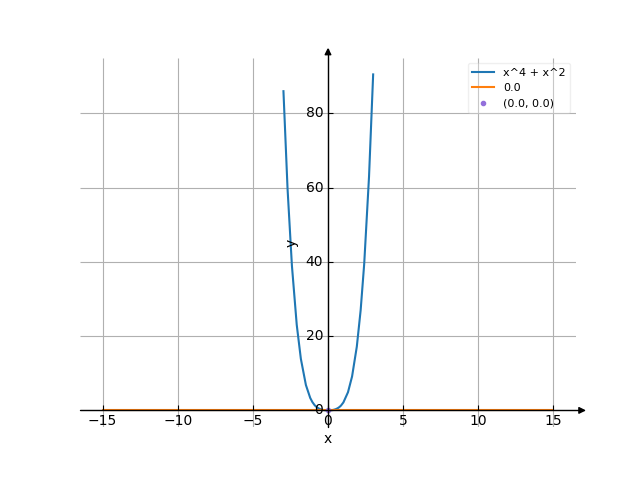x^4+x^2=0 equation
The teacher will be very surprised to see your correct solution 😉
The solution
Detail solution
Given the equation:
$$x^{4} + x^{2} = 0$$
Do replacement
$$v = x^{2}$$
then the equation will be the:
$$v^{2} + v = 0$$
This equation is of the form
$$a\ v^2 + b\ v + c = 0$$
A quadratic equation can be solved using the discriminant
The roots of the quadratic equation:
$$v_{1} = \frac{\sqrt{D} - b}{2 a}$$
$$v_{2} = \frac{- \sqrt{D} - b}{2 a}$$
where $D = b^2 - 4 a c$ is the discriminant.
Because
$$a = 1$$
$$b = 1$$
$$c = 0$$
, then
$$D = b^2 - 4\ a\ c = $$
$$\left(-1\right) 1 \cdot 4 \cdot 0 + 1^{2} = 1$$
Because D > 0, then the equation has two roots.
$$v_1 = \frac{(-b + \sqrt{D})}{2 a}$$
$$v_2 = \frac{(-b - \sqrt{D})}{2 a}$$
or
$$v_{1} = 0$$
Simplify
$$v_{2} = -1$$
Simplify
The final answer:
Because
$$v = x^{2}$$
then
$$x_{1} = \sqrt{v_{1}}$$
$$x_{2} = - \sqrt{v_{1}}$$
$$x_{3} = \sqrt{v_{2}}$$
$$x_{4} = - \sqrt{v_{2}}$$
then:
$$x_{1} = \frac{1 \cdot 0^{\frac{1}{2}}}{1} + \frac{0}{1} = 0$$
$$x_{2} = \frac{0}{1} + \frac{1 \left(-1\right)^{\frac{1}{2}}}{1} = i$$
$$x_{3} = \frac{0}{1} + \frac{\left(-1\right) \left(-1\right)^{\frac{1}{2}}}{1} = - i$$
$$x^{4} + x^{2} = 0$$
Do replacement
$$v = x^{2}$$
then the equation will be the:
$$v^{2} + v = 0$$
This equation is of the form
$$a\ v^2 + b\ v + c = 0$$
A quadratic equation can be solved using the discriminant
The roots of the quadratic equation:
$$v_{1} = \frac{\sqrt{D} - b}{2 a}$$
$$v_{2} = \frac{- \sqrt{D} - b}{2 a}$$
where $D = b^2 - 4 a c$ is the discriminant.
Because
$$a = 1$$
$$b = 1$$
$$c = 0$$
, then
$$D = b^2 - 4\ a\ c = $$
$$\left(-1\right) 1 \cdot 4 \cdot 0 + 1^{2} = 1$$
Because D > 0, then the equation has two roots.
$$v_1 = \frac{(-b + \sqrt{D})}{2 a}$$
$$v_2 = \frac{(-b - \sqrt{D})}{2 a}$$
or
$$v_{1} = 0$$
Simplify
$$v_{2} = -1$$
Simplify
The final answer:
Because
$$v = x^{2}$$
then
$$x_{1} = \sqrt{v_{1}}$$
$$x_{2} = - \sqrt{v_{1}}$$
$$x_{3} = \sqrt{v_{2}}$$
$$x_{4} = - \sqrt{v_{2}}$$
then:
$$x_{1} = \frac{1 \cdot 0^{\frac{1}{2}}}{1} + \frac{0}{1} = 0$$
$$x_{2} = \frac{0}{1} + \frac{1 \left(-1\right)^{\frac{1}{2}}}{1} = i$$
$$x_{3} = \frac{0}{1} + \frac{\left(-1\right) \left(-1\right)^{\frac{1}{2}}}{1} = - i$$
Sum and product of roots
[src]
sum
0 + -I + I
$$\left(0\right) + \left(- i\right) + \left(i\right)$$
=
0
$$0$$
product
0 * -I * I
$$\left(0\right) * \left(- i\right) * \left(i\right)$$
=
0
$$0$$
The graph


![Solve the equation x⁴+x²=0 (x to the power of 4 plus x squared equally 0) - Find the roots of the equation in detail step by step. [THERE'S THE ANSWER!] x^4+x^2=0](/media/krcore-image-pods/176/hash/equation/f/c0/11dd71682fdd5e97a934dab96583d.png)
 Equation x^4+x^2=0
Equation x^4+x^2=0
 Equation sin(8*x-pi/3)=0
Equation sin(8*x-pi/3)=0
 x^4+x^2
x^4+x^2
 x^4+x^2
x^4+x^2